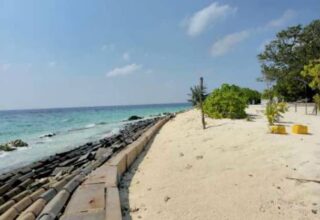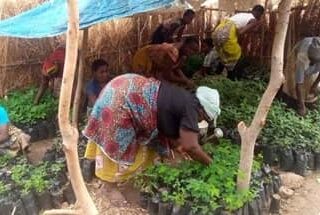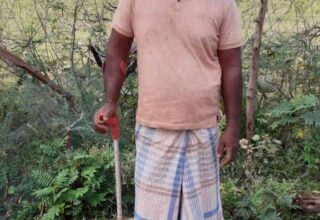In the Sussundenga district of Mozambique, one woman is helping to address the aftermath of cyclone Idai and COVID-19 among the rural farmers through her sustainable agribusiness. Doreen Tekedese reports
This is the twenty-first in the series of stories from Voices from the Frontline initiative by ICCCAD and CDKN.
Amélia Rendição, a 51-year-old woman, lives in the small village of 25 de Junho, in the Sussundenga district of Mozambique. Amélia and her husband started as subsistence farmers who mostly grew maize and a limited quantity of groundnuts and beans. They also operated a small hotel in their neighbourhood. Over the years, they earned enough money to send their four children to school as well as improve their home.
In 2017, her husband, a 76-year-old man and 25 years senior to his wife, started to experience declines in his health, forcing Amélia to step in and operate the farm. Relying on her husband’s counsel and community network, Amélia and her children facilitated the transition and started managing the farm.
Farm extension support from iDE
After taking charge of the farm, Amélia wished to extend her farm activities to generate some additional income. Eventually, with farm extension support from iDE, she enhanced her production capacity and diversity focusing mostly on horticulture.
Specifically, they offered her provision of inputs, links to output markets, technical production assistance, and/or support to agribusiness management.
Amélia’s determination and entrepreneurial motives made her a great candidate to become a Farm Business Advisor herself. In 2018, she received training on how to operate a farm extension service in her community.
Using her knowledge, Amélia diversified her farming activities by developing supply chains of horticulturalists and cereal growers, for which she serves as a district aggregator now. “To extend farm activities, I identified and negotiated fixed contracts with local government institutions, jails, hospitals and schools to supply farm produce” Amélia shares.
Recognising that she would not be able to keep up with the demand, Amélia began organising and mobilising nearby farmers, providing them with inputs (sourced from iDE-connected suppliers). She had to coordinate with the farmers in order to avoid post-harvest losses due to a lack of buyers, and this role made her the community epicentre.
Amélia’s aggregation services and supply of agro-inputs greatly helped other farmers to mitigate their farming costs. It also motivated them to engage in community-based savings and loans groups.
To cater to the growing demand of fresh farm produce, Amélia involved more local farmers in her business. Since most of the farmers Amélia works with live in remote areas with few transport options, she felt a vehicle was necessary to facilitate the aggregation and distribution process. Through accessing KIVA loans and being able to repay them, Amélia managed to buy increasingly large vehicles to support her marketing needs.
As demand for produce surged, she got involved with Export Trading Group (ETG), leading her to expand her buyers’ network into the entire district of Sussundenga and entering the market of sesame seeds.
In spite of multiple shocks, entrepreneur sees opportunities for future resilience
In March 2019, Cyclone Idai made landfall in central Mozambique, wreaking havoc across the region including Amélia’s native district of Sussundega. This put Amélia and nearby farmers in an incredibly volatile economic situation, destroying nearly all of their pending harvest and distorting the market for months afterwards.
Exactly a year later, COVID-19 further exacerbated supply chains due to hikes in transportation costs and lulls in buyer demand. Amélia was already struggling with the aftereffects of Cyclone Idai and the COVID-19 pandemic, then her husband was hospitalised in May 2020 due to an existing health condition, later passing away. The loss of her husband compounded both her stress and anxiety, forcing her attention away from the farm business.
“COVID-19 has affected my business by limiting the ability to aggregate production from the remote areas since local leaders were reluctant to allow community members to leave their homes and interact. This has led to a delay in transporting goods to hospitals, schools and jails,” she shares.
Due to her community connections, as well as linkages with input suppliers and off takers like Export Trading Group (ETG), she was able to renegotiate offtake contracts and her KIVA loan. She is now gradually getting back into the swing of her business, preparing for the next agrarian season which hopefully will be more promising.
After COVID-19, iDE supplied Amélia and 300 other rural entrepreneurs with smartphones and solar chargers to streamline technical extension information with their last-mile partners. This experience has opened her eyes to the possibilities of communicating with her network of farmers.
“The past year of climate, economic, and personal shocks have shown me that communication is the backbone to my business. With improved communication, we will be able to recuperate more quickly. This year I learned that I need to be ready for the next time life confronts me and my community with these challenges,” Amélia shares.
The COVID-19 pandemic has demonstrated to Amélia that she needs to think more critically about the diversification of her income generating activities. As a rural entrepreneur, she is keen to serve as a rural supplier of essential services such as small-scale pay-go solar home systems.
“Solar radios would allow me to transmit information to my vast network of producers including climate related information, market prices, and other relevant information in real-time,” she proposes.
“I plan to serve as a market leader in the aggregation of vegetables and cereals in the province of Manica, scaling up my logistical and supply chain management capacity,” she concludes.
Interviewer’s Perspective
In the face of many destabilising shocks, front-liners like Amélia have defied the odds and remained steadfast. Her investments in infrastructure and building a network of customers and suppliers in the district of Sussundenga have given her a comparative advantage over others. To be able to prepare farming communities for future uncertainties, more investments should be made to build linkages among vast networks of farmers and promote sustainable agro-business.
About the interviewer
Doreen Tekedese is iDE Mozambique’s gender specialist in the Beira corridor, supporting the FBA programme by identifying women entrepreneurs and working with them to establish and operate businesses that support the agricultural sector. In the post-Idai context, Doreen has been training these FBAs in how to support rural families that have experienced these climate shocks. Since 2018, Doreen has been working with Amélia and is very familiar with Amélia’s personal and business story.
About the interviewee
Amélia Rendição is a local farmer living in the small village of 25 de Junho, in the Sussundenga district of Mozambique.






